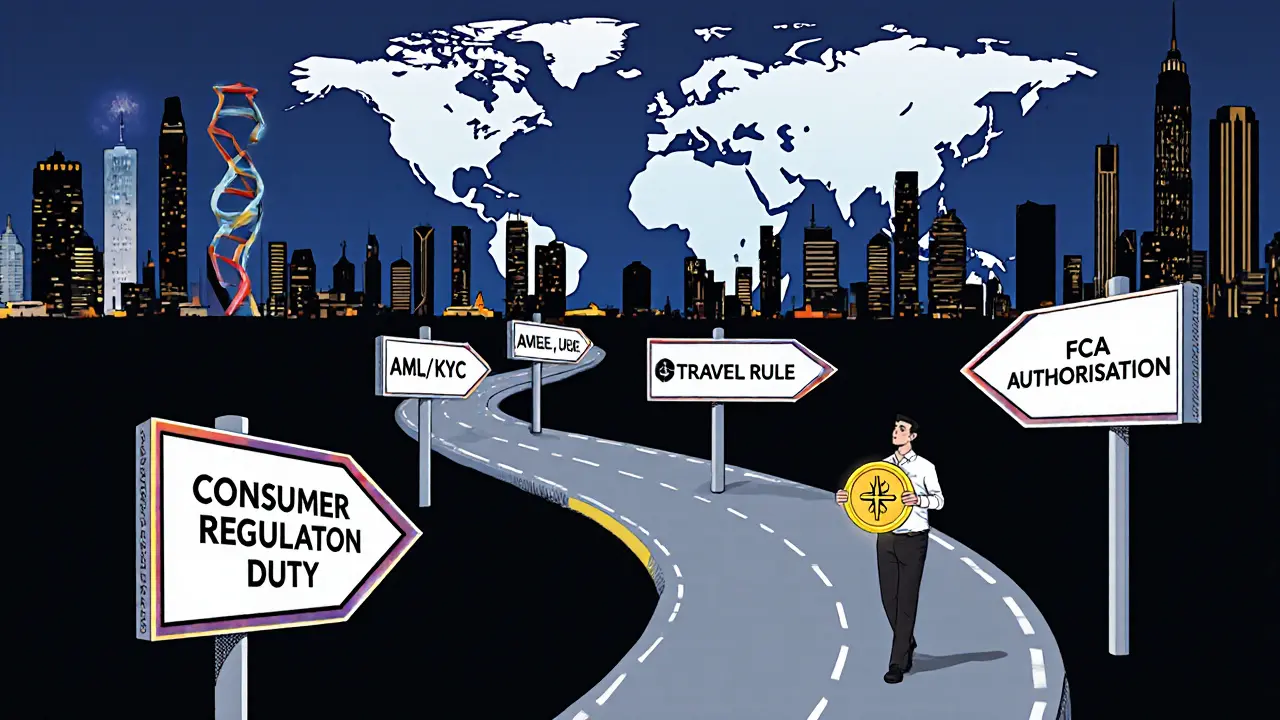- Home
- Cryptocurrency
- UK Crypto Hub: Ambitions, Policies & Regulation

UK Crypto Hub: Ambitions, Policies & Regulation
UK Crypto Compliance Checker
Business Type
Services Offered
Compliance Requirements
Based on your selections, the following requirements apply to your business:
Important Note
This tool provides general guidance only. Always consult the FCA's official guidance and seek legal advice for your specific situation.
UK Crypto Hub Strategy is the United Kingdom’s plan to become a global centre for digital asset innovation while keeping users safe. Launched in 2023, the strategy ties together government vision, the Financial Conduct Authority (FCA) enforcement, and new legislation aimed at stablecoins, tokenised securities and consumer protection.
Why the UK wants to be a crypto hub
By 2024 roughly 12% of UK adults - about 7 million people - owned or had owned crypto. That level of adoption is higher than most major economies and gives the UK a ready‑made user base for innovative services. The government sees three main benefits:
- Boosting the financial services sector’s global reputation.
- Attracting foreign investment and high‑skill talent.
- Generating tax revenue from a rapidly growing market.
All of this is wrapped in a political narrative of “digital Britain” - a push to keep the country at the forefront of fintech after Brexit.
Phase 1: Getting stablecoins under control
Phase 1 focuses on fiat‑backed stablecoins, which the FCA treats like electronic money. The three pillars are:
- Creating a Regulated Activities Order (RAO) that gives the FCA authority to licence issuance and custody services for stablecoins operating in the UK.
- Applying the Payment Services Regulations 2017 to stablecoin‑based payment chains, meaning providers must register as payment institutions.
- Giving the Bank of England oversight of systemic payment‑system risks linked to stablecoins.
This tiered approach lets firms test the waters while giving regulators clear levers to intervene if a stablecoin threatens financial stability.
Phase 2: The full crypto‑asset regime
Phase 2 expands the regulatory perimeter to cover almost every non‑security token activity. The upcoming Financial Services and Markets Act 2000 (Regulated Activities and Miscellaneous Provisions) (Cryptoassets) Order 2025 (the Cryptoassets Order) brings the following under FCA supervision:
- Issuance and exchange of tokenised assets.
- Leverage‑based lending, borrowing and margin trading.
- Custody, safeguarding and administration services.
Importantly, the order applies to activities "in or to" the UK, meaning foreign firms serving UK customers must also comply - a broader net than traditional FSMA rules.
Key compliance checkpoints for firms
For any business looking to operate under the new regime, the checklist below helps avoid costly pitfalls:
- Registration: Apply for FCA authorisation under the appropriate activity class (e.g., crypto‑exchange, custodian).
- Consumer Duty: Demonstrate that policies deliver good outcomes for users - transparent fees, clear risk warnings and robust complaint handling.
- Operational resilience: Put in place systems to detect fraud, maintain data integrity and survive cyber‑attacks.
- Travel Rule compliance: Share required transaction information with counterparties for cross‑border transfers.
- Anti‑money‑laundering (AML): Implement KYC checks that meet the updated Money Laundering Regulations.
- Reporting: File regular returns to the FCA on transaction volumes, suspicious activity and capital adequacy.
Missing any of these steps can trigger enforcement action, fines, or even criminal prosecution under the Economic Crime and Corporate Transparency Act.

Consumer protection: what users can expect
The FCA is pushing for crypto‑related disputes to be handled through the Financial Ombudsman Service. If a firm meets the new standards, a consumer can lodge a complaint and receive a decision within eight weeks - a big step up from the current ad‑hoc approach.
Additionally, the regulator is drafting guidance on how the Consumer Duty applies to crypto advertising. Expect future adverts to include clear risk warnings, similar to those required for high‑risk investments.
International cooperation: the UK‑US Financial Regulatory Working Group
During UK Fintech Week, the Chancellor announced a joint UK‑US Financial Regulatory Working Group. Its purpose is to align supervisory expectations for cross‑border crypto services, share AML intelligence, and develop common standards for stablecoin oversight.
This partnership signals that the UK is not trying to go it alone; it wants recognition from other major jurisdictions such as the United States, the European Union and Singapore.
How the UK stacks up against other crypto‑friendly nations
Below is a quick snapshot comparing the UK’s measured approach with three alternative models.
| Jurisdiction | Regulatory tone | Key focus | Speed of implementation |
|---|---|---|---|
| United Kingdom | Measured, risk‑based | Consumer protection, systemic stability | Phased (2023‑2026) |
| United States | Fragmented (federal + state) | Investor protection, AML | Ongoing, varies by state |
| Singapore | Pro‑innovation sandbox | Business attraction, fintech growth | Rapid (sandbox licences within weeks) |
| China | Restrictive, outright bans | Capital controls, financial sovereignty | Immediate shutdowns |
The UK lands in the middle: not as fast as Singapore’s sandbox but far less prohibitive than China’s ban.

Political realities and the future outlook
After the 2024 election, the Labour government signalled a softer tone on crypto. While the regulatory machinery continues, political enthusiasm has waned. Industry insiders note fewer high‑profile announcements and a slower rollout of the Cryptoassets Order.
Nevertheless, the core legislation is in place, and the FCA’s consultation process remains active. If the UK can keep the regulatory framework clear and enforce it consistently, the country could still attract firms that value certainty over speed.
Next‑step guide for crypto businesses eyeing the UK market
Use the following three‑step roadmap to decide whether to expand into the UK:
- Assess fit: Do you issue a stablecoin or a tokenised asset that will be offered to UK residents? If yes, you’ll need FCA authorisation.
- Build compliance: Map your AML/KYC processes to the updated Money Laundering Regulations, integrate Travel Rule data sharing, and prepare consumer‑duty disclosures.
- Engage early: Join the FCA’s consultation webinars, submit feedback on the Cryptoassets Order, and consider a UK‑based advisory partner to smooth the licensing journey.
Following these steps can shave months off the time it takes to go live.
Bottom line
The UK crypto hub ambition is a long‑term play that balances innovation with a strong safety net. Phase 1 already puts stablecoins under the FCA’s watchful eye, while Phase 2 expands that oversight to the whole crypto‑asset ecosystem. The success of the strategy will hinge on political continuity, clear guidance from the FCA, and the UK’s ability to signal to the world that it offers both regulatory certainty and a vibrant fintech ecosystem.
What is the UK Crypto Hub Strategy?
It is the UK government’s plan, launched in 2023, to position the country as a leading jurisdiction for digital‑asset innovation while protecting consumers through new regulations overseen by the FCA and the Bank of England.
When will Phase 2 regulations take effect?
Phase 2 is scheduled for full implementation by the end of 2025, with the Cryptoassets Order already published in April 2025 and consultation responses expected in early 2026.
Do UK crypto firms have to join the Financial Ombudsman Service?
The FCA is drafting rules that would allow consumers to bring complaints against authorised crypto firms to the Financial Ombudsman Service, giving them the same recourse as with traditional banks.
How does the UK’s approach differ from Singapore’s sandbox model?
The UK favours a phased, risk‑based regime with clear consumer‑protection rules, whereas Singapore offers rapid sandbox licences that let firms test ideas with fewer initial restrictions but with a narrower regulatory scope.
What are the biggest compliance hurdles for a crypto exchange entering the UK?
Key hurdles include obtaining FCA authorisation, meeting the Consumer Duty’s transparency standards, implementing robust AML/KYC processes, and integrating the Travel Rule for cross‑border payments.
Cormac Riverton
I'm a blockchain analyst and private investor specializing in cryptocurrencies and equity markets. I research tokenomics, on-chain data, and market microstructure, and advise startups on exchange listings. I also write practical explainers and strategy notes for retail traders and fund teams. My work blends quantitative analysis with clear storytelling to make complex systems understandable.
Popular Articles
16 Comments
Write a comment Cancel reply
About
DEX Maniac is your hub for blockchain knowledge, cryptocurrencies, and global markets. Explore guides on crypto coins, DeFi, and decentralized exchanges with clear, actionable insights. Compare crypto exchanges, track airdrop opportunities, and follow timely market analysis across crypto and stocks. Stay informed with curated news, tools, and insights for smarter decisions.








They’re secretly using the FCA to control every crypto wallet!!!
The UK’s attempt to position itself as a crypto haven is just a copy of the US model, but they lack the real market depth we have at home.
In the grand theater of finance, the UK is the understudy, hoping the spotlight will ever truly shine on its crypto ambitions; the audience, however, remains skeptical, and the curtain may never rise.
Yo, they think they’re slick-big govt wizards pulling strings, planting backdoorz in every stablecoin, watch out!!!
The FCA’s phased approach essentially layers traditional financial regulation onto digital assets-think AML/KYC, Consumer Duty, and the Travel Rule-all of which you’ll need to embed into your compliance stack before you can even think about launching in the UK.
Spot on, James! 👍 The UK may be measured, but it’s also a massive market for fintech talent, so getting those controls right is worth the effort.
It’s encouraging to see that the consumer‑protection framework is finally catching up; the clearer the rules, the more confidence users will have in exploring crypto services.
That confidence is only justified when firms act ethically-no cutting corners on disclosures or hiding fees. 🛡️
Remember, compliance isn’t just a checklist; it’s a mindset. Treat each regulation as a chance to build trust with your users, and the market will reward you.
Start by mapping your current AML procedures to the UK’s Money Laundering Regulations; you’ll spot gaps quickly.
Oh great, another “simple” mapping guide-because aligning global AML standards is just a walk in the park, right?
The UK’s crypto regulatory roadmap is ambitious, aiming to blend innovation with consumer safeguards.
Phase 1’s focus on stablecoins reflects a pragmatic step to bring fiat‑backed tokens under existing electronic‑money rules.
By requiring FCA licensing, the authorities ensure that issuers have adequate capital and governance structures.
The involvement of the Bank of England adds an extra layer of systemic oversight, which is critical for payment‑system stability.
Phase 2 expands the net to cover tokenised securities, margin trading, and custodial services, effectively bringing most crypto activities into the regulatory fold.
This broader perimeter means that foreign firms serving UK customers cannot simply ignore UK law.
The Consumer Duty provisions push firms to be transparent about fees, risks, and complaint handling, which should protect retail users.
Travel Rule compliance, while technically demanding, will improve traceability of cross‑border transactions.
The FCA’s push for dispute resolution through the Financial Ombudsman Service is a welcome upgrade from the current ad‑hoc processes.
However, the phased rollout also introduces uncertainty for businesses that must wait for final guidance before fully committing resources.
The political shift after the 2024 election may slow the momentum, but the underlying legislation remains intact.
International cooperation with the US and other jurisdictions could harmonise standards, reducing compliance costs for multi‑jurisdiction firms.
From a strategic perspective, the UK positions itself as a middle ground-neither as rapid as Singapore’s sandbox nor as restrictive as China’s outright bans.
Companies that value regulatory certainty over speed are likely to view the UK as an attractive destination.
Ultimately, the success of the hub will depend on consistent enforcement and clear communication from the FCA.
Indeed, the structured approach underscores the UK's commitment to fostering a secure environment; diligent firms that align early will reap long‑term strategic benefits.
Let’s celebrate this bold step forward!!! The future of crypto in the UK looks bright!!!
yeah its good but we still gotta watch the regs
I totally get that feeling-when the rules keep changing it feels like you’re walking on sand while trying to build a house, and that uncertainty can really drain the excitement out of any project; just remember you’re not alone in this, many startups are wrestling with the same compliance puzzles, and sharing experiences can lighten the load.